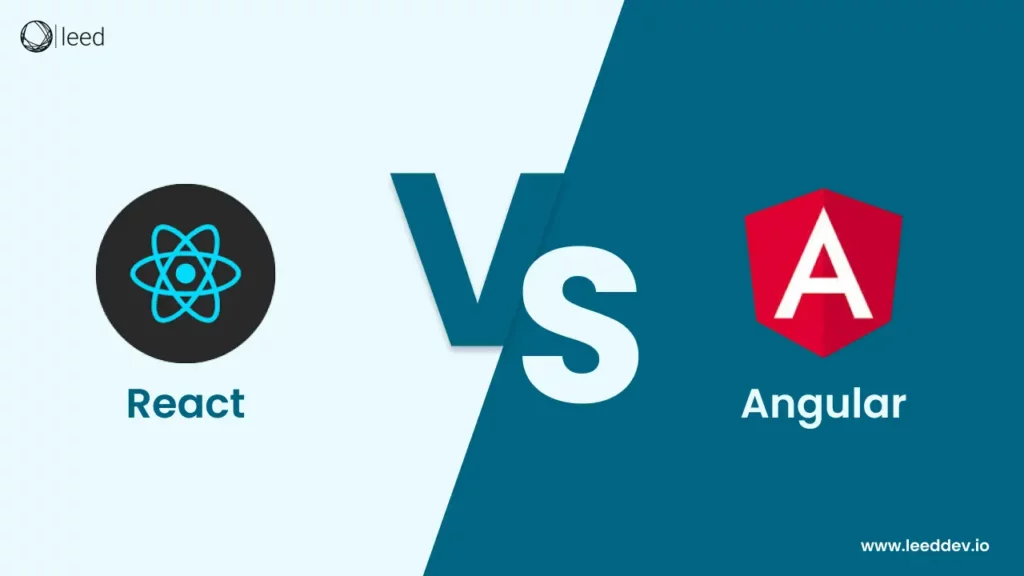“React vs Angular” Which one will be best for your next project? React is known for its simple and flexible nature, while Angular is a complete solution for building large apps. Both are popular, React has over 170,000 stars on GitHub, and large companies like Google and Microsoft use Angular.
In this guide, we’ll compare React vs Angular performance, and popularity, and highlight the major differences. This will help you to choose the best one for your project.
What is React?
React is a free JavaScript library that helps build user interfaces (UI). It’s great for creating interactive and dynamic apps by breaking them into small, reusable pieces called components.
Made by Facebook, React is supported by a big community of developers. It has useful features like a simple design, JSX (a mix of JavaScript and HTML), a virtual DOM for fast updates, and one-way data flow for better control.
React is perfect for adding interactive features to websites and building single-page apps (SPAs). You can use it with JavaScript or TypeScript. Big names like Facebook, Netflix, Discord, Shopify, and Microsoft use React.
Unlike Angular, React focuses only on UI, giving developers more flexibility. Its virtual DOM updates just the parts of the page that change, making apps faster and easier. It’s a great choice for building modern and dynamic web apps.
Key Features of React
- React applications use a component-based architecture with reusable components for logic, presentation, and style.
- They use a virtual DOM, a lightweight representation of the real Document Object Model, to improve page speeds.
- React also uses JSX, a JavaScript syntax extension, to improve readability for UI components.
- A one-way data flow system simplifies data changes and makes the application state more predictable. This makes it easier to understand and adapt to changes.
Companies Using React
Here’s a list of leading companies that rely on the React library to power their user interfaces:
- Facebook: Facebook.com, Instagram
- WhatsApp: WhatsApp Web
- Shopify: Shopify.com, Shopify Admin
- Airbnb: Airbnb.com
- Netflix: Netflix.com
These industry giants showcase the versatility and reliability of React in creating dynamic, high-performance user experiences.
Advantages of React
React is a highly popular JavaScript library known for its flexibility, performance, and ease of use. It has become the preferred choice for many developers and companies for building user interfaces. Here are the key benefits of React:
1. Reusable and Predictable Code
React promotes a component-based architecture, allowing developers to reuse code across projects. This approach makes the code more predictable and easier to maintain.
2. Faster Development and Debugging
- Declarative Views: React’s declarative approach simplifies debugging by making the UI more predictable.
- One-Way Data Binding: React’s one-way data flow ensures better control over how data is managed and displayed, making debugging more straightforward compared to two-way data binding in other frameworks like Angular.
3. High Performance
- Virtual DOM: React uses a virtual DOM to efficiently update only the parts of the UI that need changes, improving performance and reducing page load times.
- Small Bundle Size: As a library rather than a full framework, React is lightweight, resulting in faster downloads and less performance overhead.
4. Flexibility and Integration
- React doesn’t enforce a specific structure, giving developers the freedom to build projects their way.
- It can be integrated into existing projects, allowing a gradual migration to a component-based architecture without starting from scratch.
- Developers can enhance functionality by incorporating a wide range of third-party libraries.
5. Support for Mobile App Development
With React Native, developers can create mobile apps using the same React principles, enabling faster development for both web and mobile platforms.
6. Server-Side Rendering (SSR)
React supports server-side rendering, which helps improve page load times, user experience, and SEO rankings. Features like code splitting also ensure smooth performance and faster loading for React apps.
7. Improved Developer Productivity
- React’s gradual learning curve makes it easy for developers, especially those familiar with JavaScript, to get started quickly.
- Comprehensive documentation and a large developer community provide plenty of tutorials and resources to streamline the learning process.
8. Backward Compatibility
React makes it simple to migrate between different versions, ensuring long-term support and stability for applications.
Disadvantages of React
- React applications, like Angular applications, also apply client-side rendering, making it challenging for search engines to crawl and index interactive content. You’ll need to make a conscious effort to implement server-side rendering (SSR).
- The maintainability of React codebases is considered an issue due to the rapidly evolving React ecosystem. Updating a React project and its dependencies from a year ago requires a lot of work to manage numerous minor, major, and breaking changes.
- The React ecosystem is vast and expanding, with additional libraries and tools available. This can be overwhelming, especially for new developers, and can lead to decision fatigue when choosing the right tools for a project.
- React is primarily concerned with building powerful user interfaces and will require additional tools, including react-router-dom and redux, to introduce routing and state management features.
Despite the above disadvantages, React remains one of the leading JavaScript libraries for web application development. This is precisely why many major companies and large enterprises leverage React for their applications.
What is Angular?
Angular is a popular framework for building web applications, especially single-page applications (SPAs). It’s built with TypeScript, an extension of JavaScript, and follows the Model-View-Controller (MVC) pattern for better structure.
With Angular, you can create interactive web apps, reuse components, manage app states, handle client-side routing, load data from the backend, and work seamlessly with browsers.
Google developed Angular, and it’s free and open-source, making it accessible for all kinds of projects. Big names like Gmail, Upwork, PayPal, YouTube, and Weather.com use Angular for their platforms.
Angular has a specific way of organizing code, which can make it tricky to use with older websites. It was originally created in 2010 by Miško Hevery and gained popularity for its mobile-friendly and open-source design.
In 2016, Angular underwent a major update to match modern JavaScript standards. This improved its performance and made it easier to maintain for large projects.
Key Features of Angular
- Angular is an open-source framework for web app development, known for its ease of building, managing, testing, and updating.
- It features Rxjs and AngularCLI, which make it easy to build, manage, test, and update.
- Angular also supports views without browser-side rendering and server-side rendering quickly.
- Key features include two-way data binding, which synchronizes the user interface with the underlying model/class data. It reduces the need for manual DOM manipulation.
- TypeScript integration improves code quality and refactoring capabilities, while dependency injection promotes reusable components.
- The Angular Command Line Interface (CLI) automates tasks and simplifies the development process.
- Angular also offers performance improvements and security, making it a leading open-source framework for web app development.
- It is used by real-world applications and companies.
Companies using Angular
Due to its stability and proven performance, Angular has become a go-to framework for enterprise teams. Many renowned brands rely on Angular to power their applications, including:
- Google: Gmail, Google Drive
- Samsung: Samsung Health, Samsung Members
- PayPal: PayPal Checkout, PayPal Business
- Forbes: Forbes.com
- Upwork: Upwork.com
These high-profile examples demonstrate Angular’s reliability and versatility in building robust applications. Now, let’s explore the key advantages and disadvantages of using the Angular framework.
Advantages of Angular
Angular is a powerful framework that makes it easy to build scalable and maintainable applications. Enterprise teams trust it for its rich features and structured approach. Let’s explore why Angular is a great choice:
1. Easy to Manage and Scale
Angular provides a clear structure with components and modules, making it easier to build, update, and scale applications. New developers can quickly understand and join projects without any hassle.
2. Boosts Developer Productivity
- TypeScript: Angular uses TypeScript, which helps catch errors early and makes coding faster with smart suggestions and auto-complete.
- Built-In Tools: Tools like AngularCLI and RxJS make development smoother and save time when handling complex tasks.
- Testing Made Simple: Angular includes testing tools, so you can easily test and improve your app without needing extra setups.
3. All-in-One Solution
Angular has everything you need to build a full application, including:
- Tools to connect to APIs and manage data easily.
- A routing system to create pages and sections for your app.
- Interactive UIs with two-way data binding for a seamless user experience.
- Reusable components to keep your code clean and organized.
4. Faster Performance
- Lazy Loading and AOT Compilation: These features help your app load faster and run more efficiently.
- Server-Side Rendering: Angular supports server-side rendering, making apps load quickly and improving SEO.
5. Strong Community and Support
Angular is backed by Google, offering regular updates, great documentation, and long-term support. The large community also means you’ll always find solutions and resources when you need help.
6. Simpler Code and Workflow
Angular reduces the amount of code you need to write. Its dependency injection and clear structure make your code easy to read, manage, and reuse.
7. Well-Organized Development
Angular encourages organized coding practices. This makes it easier to find, understand, and update code even months or years later.
Disadvantages of Angular
While Angular is a great framework, it does come with a few challenges that you should keep in mind:
Takes Time to Learn
Angular can be harder to pick up, especially for beginners. Its use of TypeScript and many built-in features can feel overwhelming at first. Compared to simpler frameworks like React or Svelte, learning Angular may take more time.
SEO Issues
Since Angular uses JavaScript to render content on the client side, search engines may have trouble indexing it. This can lower your app’s SEO ranking, which might impact its visibility online.
Less Flexibility
Angular has a strict way of building applications, which is great for consistency. However, it gives developers less freedom to organize apps in their own way, unlike more flexible frameworks like React.
Can Be Hard to Debug
Finding and fixing issues in larger Angular applications can be tricky. The way components, modules, and dependency injections interact adds to the complexity.
More Code to Write
Angular often requires more code due to its detailed structure. While this helps with maintainability, it can feel repetitive or excessive for developers used to simpler frameworks.
Let’s look at how popular both technologies are among developers.
Which one should you learn if you’re learning to code?
When you’re just starting to learn coding, it’s not about picking the “right” tool it’s about building problem-solving skills, understanding programming logic, and practicing good habits. These skills apply to any programming language or platform. Once you have those basics down, learning new tools is mostly about picking up their syntax and structure.
For beginners, React is a great choice. It’s simple and lets you start small by building basic components and experimenting in your browser. As you progress, you can create more complex components, work with APIs, and eventually build full applications. Plus, React uses plain JavaScript, which is beginner-friendly.
Angular, on the other hand, is a full framework with more features. While powerful, it has a steeper learning curve. To use Angular effectively, you need to understand how the entire framework works. It also uses TypeScript, which can be tricky if you’re new to programming.
If you’re already an experienced programmer, your choice depends on your career goals. Look into which tool, React or Angular is more commonly used in the industry you want to work in and start there.
Choosing Between React vs Angular for Your Project
Choosing the right framework is key to a successful project. At Leed Software Development, we help businesses pick the best technology for their needs. Here’s how we can guide you:
1. React for Existing Projects
If you already have a running application, React is a great choice. It allows you to add new features without starting from scratch. We can help you integrate React smoothly to improve your app’s interactivity and user experience.
2. Angular for New Projects
If you’re starting a project from scratch, Angular is a strong option. It provides a structured framework for building scalable and reliable applications. We can build your app with Angular, ensuring a solid foundation for the future.
Why Choose Leed Software Development?
- Expert Advice: We help you decide if React or Angular suits your project best.
- Custom Solutions: We tailor our approach to meet your specific needs.
- Third-Party Support: We integrate your app with libraries, tools, or platforms like Contentful.
- Faster Development: Our skilled team works efficiently to save you time and money.
How We Help You:
- Build responsive and user-friendly interfaces.
- Create scalable apps that grow with your business.
- Provide ongoing support to keep your app up-to-date.
At Leed Software Development, we simplify the process and deliver solutions that drive results. Let us help you build a powerful application with the best tools for your goals.
FAQs
Which pays more, Angular or React?
Salaries depend on location and experience, but React developers generally earn slightly more because of React’s higher demand in the job market.
Is Flutter better than Angular?
Flutter and Angular are used for different purposes. Flutter is best for creating mobile apps, while Angular is better for building large web apps. The choice depends on your project needs.
Which backend is better for React?
Node.js is the most popular backend for React because they both use JavaScript, making integration smoother. Other options like Django or Express.js also work well.




